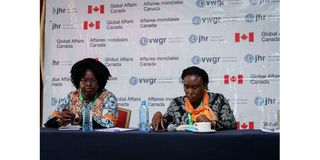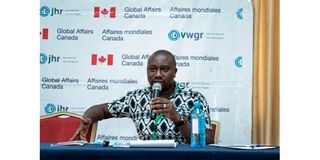Want media visibility? Be where the action is, women told

Rangwe MP Dr Lilian Gogo (L) with Daily Nation Executive Editor, Pamella Sittoni during the Annual Human Rights Conference in Nairobi last Thursday. Ms Sittoni urged women to be strategic in seizing opportunities for media coverage.
What you need to know:
- Media executives and stakeholders have advised women, especially politicians, to be strategic and aggressive in seizing opportunities for coverage.
- Women also need to be media savvy and deliberate in identifying coverage opportunities for them.
Women need to be where there action is to increase their media visibility.
During the Annual Human Rights Conference, held at a Nairobi hotel last Thursday, media executives and stakeholders advised women, especially politicians to be strategic and aggressive in seizing opportunities for coverage.
“It is very difficult to search for women to give them coverage when they are not where the action is,” said Daily Nation, Executive Editor Pamella Sittoni during the conference convened by Journalists for Human Rights (JHR).
Women also need to be media savvy and deliberate in identifying coverage opportunities for them
“We need to train the women to look out for opportunities to be heard and seen in the media,” she observed.
She, however, noted the need for training of media professionals to produce gender sensitive and balanced stories.
A 2020 Missing Perspectives of Women in News survey commissioned by Bill and Melinda Gates Foundation, and in which India, Kenya, Nigeria, South Africa, UK and the US were surveyed on news coverage, found that less than one per cent of the news stories cover gender equality issues.
Senior political reporter with NTV, Kennedy Mureithi, said women must be aggressive in creating opportunities for themselves to be covered and push for the media space whenever they feel left out.

NTV Senior political reporter Kennedy Mureithi, speaks during the Annual Human Rights Conference last Thursday. He urged women to push for the media space whenever they feel left out.
“The other day (December 7), about 50 MPs from ODM and one from Jubilee toured Kasarani to inspect (Azimio la Umoja preparations). After all the men had spoken, Gladys Wanga Homa Bay County Woman Representative) came and pushed them and said I must speak. And in 90 per cent of the media houses she was covered. Did she fight for her space?” he asked.
On her part Rangwe MP, Dr Lilian Gogo appreciated the media for the support it accorded her during her pursuit for the parliamentary seat in 2017. She is defending it in 2022.
She urged women to be strategic in ensuring their voices are heard in the media, like being the first to spot a journalist and grant an interview or ask to be interviewed.
She, however, called on the media to be deliberate in covering women.
“When you attend an event, please don’t take shots of those who’ve arrived early and leave it at that. You will miss women in those shots. Please take others later and you will surely find us there,” she said.
For Gender Chief Administrative Secretary Beatrice Elachi, the media has a great role to play in ending violence against women during the electioneering period.
She said spotlighting violence against female aspirants would prompt the Independent Electoral and Boundaries Commission and security agencies to take action against the perpetrators.
Sexual harassment
She decried widespread sexual harassment across all sectors, making an appeal to the media to raise awareness on its impact to women’s development.
Meanwhile during the event, Journalists for Human Rights jointly with Association of Media Women in Kenya endorsed the anti-sexual harassment in media committee.
JHR Gender Lead, Winnie Syombua, said the committee would look into sustainable solutions of ending sexual harassment in the media.
“The team has already worked on a model anti-sexual harassment policy that would be adopted by the media houses,” she said.





